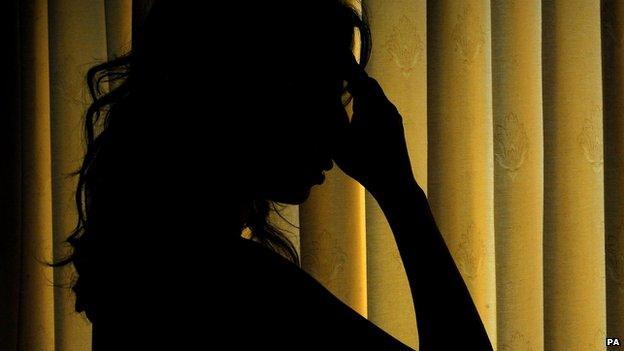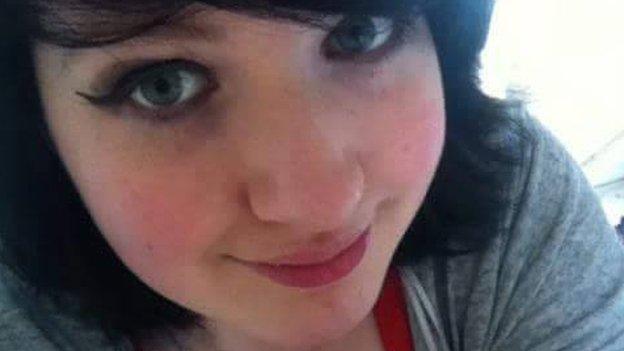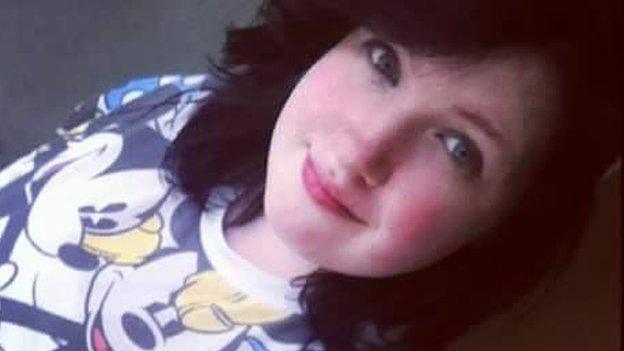Schools 'struggling to cope' with students self-harming
- Published

Schools are struggling to deal with rising numbers of students self-harming, two major teaching unions say.
The number of pupils hurting themselves is said to be at a high.
NHS figures obtained by BBC Newsbeat show a 20% rise in the number of 10 to 19-years-olds admitted to hospital because of self-harm injuries across England, Wales and Northern Ireland.
The government says it has asked experts to examine how to tackle self-harming and related issues in schools.
The NHS figures show the number of hospital admissions rose from 22,978 in 2012-13 to 28,730 in the following year.
Figures for Scotland were not available.
According to the National Association of Head Teachers and the Association of Teachers and Lecturers, spending cuts to local services have left schools without as much expert medical help as in the past.
Get more information and links to support for self harm from BBC Advice
.jpg)
Dr Max Davie, a spokesperson for the Royal College of Paediatrics and Child Health (RCPCH), says feeling pressured at school, or by friends, family and the media can all play their part in why young people self-harm.
"[These figures] are very worrying," he said.
"We have to remember that people self-harm because they're in psychological distress that's so severe that they prefer physical harm or physical pain to their psychological state.
"So the real question is why are more young people experiencing unbearable psychological distress?
"They are often isolated and if that isolation is extended to their own families that can be very serious and damaging.
"There aren't enough services. If they reach out and talk about their problems there is often no-one there who is able to listen who is able to address their issues".

'My college years were when self-harming was at its peak for me'
Holly Rabey, 19, from Plymouth, was 12 when she first started to hurt herself.
"I started because I was bullied in school which caused a lot of anxiety.
"It went from scratches on my forearms to deeper cuts on my wrists and my legs, on my sides, on my stomach.
"I sometimes bruised myself. I would sometimes burn myself as well."
At her lowest point Holly was admitted to hospital after overdosing.
"I was in my bedroom. I'd had a terrible day at college and I started cutting myself on my wrists and I was very, very scared of myself and what I was doing.
"There was a lot of blood and I felt like I needed a way out.
"I felt like I needed to die."

'I was around 16 or 17 when this photo was taken. I was very much involved in self-harm'
Holly was saved after being taken to hospital by paramedics and treated for her overdose.
After getting help from Child and Adolescent Mental Health Services with both therapy and medication she managed to turn herself around and is now enjoying university life in Plymouth.
"I did find some true friends and I've been through a lot but it was meeting my girlfriend and getting engaged, experiencing life and knowing it is worth living so that's who I am now and I'm very happy with it."
Caroline Kolek, a secondary school teacher and spokesperson for the Association of Teachers and Lecturers, said: "My experience in schools and talking to colleagues is that we are seeing a rise in self-harm, predominantly among girls but also among boys as well.
"My reaction to those figures is disappointment really. We recognise anxiety and depression is on the rise among young people.
"Unfortunately there is a correlation [between the figures and] a decrease in funding for mental health services - we've lost our emotional wellbeing workers who used to come into schools, we've lost youth workers and there is certainly a massive underfunding in mental health services for young people so many aren't getting the support, and their families, aren't getting the support they need.
"We schools really don't have the support we had four or five years ago."
Emma's story: 'Why I started to self-harm aged 12'
Social media
"When it comes to social media I certainly wouldn't demonise [any network]. I don't think at the moment we fully understand the role social media plays in the rise of self-harm among young people," she added.
"I am aware of young people who have self-harmed and then put photographs up on social media and they have had very negative comments which has led to bullying. And they've had copycat scenarios."
The government has responded to claims that cuts in local services mean schools are struggling to cope with self-harm.
Care Minister Norman Lamb said: "Self-harm is a sign of serious emotional distress and it is crucial that young people get the help they need.
"I've brought together a team of specialists to look at how we can improve care - including in our schools - and we are investing £150m over the next five years to help young people deal with issues like self-harm and eating disorders."
Follow @BBCNewsbeat, external on Twitter, BBCNewsbeat, external on Instagram and Radio1Newsbeat, external on YouTube